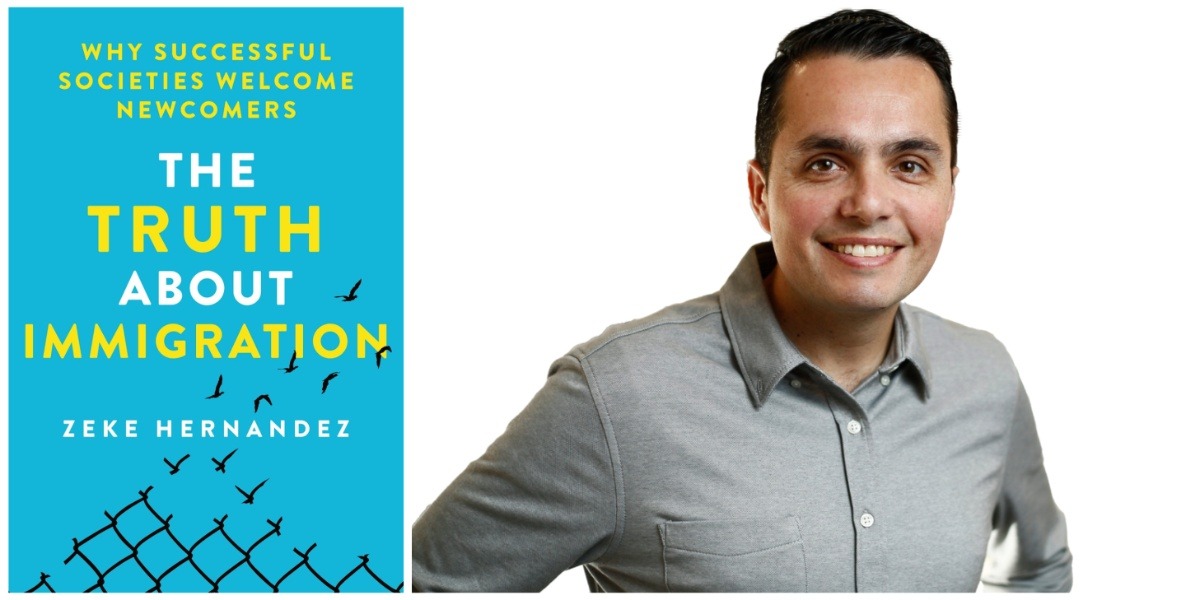When Zeke Hernandez, born in Uruguay and raised in several countries in Central and South America, moved to the U.S. for graduate school, he never intended to study immigration. After being exposed to poverty, he just wanted to understand what creates economic prosperity.
“As I started trying to understand how the economy grows and how businesses affect the economy, I realized that I could not separate that from the movement of people,” Hernandez says. “Because people bring ideas and investment and skills to an economy, and that’s central to how economies grow.”
On Tuesday, Hernandez — now a Wharton professor — will share some of the findings he’s amassed during almost 20 years of research into how immigrants create economic and social benefits in their communities, at a book signing hosted by The Welcoming Center.
Hernandez was motivated to write his new book, The Truth About Immigration: Why Successful Societies Welcome Newcomers, after presenting his research to different audiences, whom he realized all held misconceptions about immigration regardless of their background and political leanings.
There are two prevalent but false narratives that he sees spreading across the U.S. and beyond: the “villain” narrative, and the “victim” narrative. The “villain” narrative has been pushed by political groups including the modern-day Republican party, and purports that immigrants are stealing jobs, breaking laws, and failing to assimilate.
However, he says, the often-used counterargument, the “victim narrative,” isn’t true either. It paints immigrants as “the tired, the poor, the needy,” who are worthy of compassion, but not contributing to society.
Because these two versions of the story are built up by politicians and portrayed in the media, one of the two is what the average person believes, according to Hernandez.
“What the research shows, and what I’m trying to communicate through the book is that it’s immigrants are neither villains nor victims. Immigrants are net positive contributors to everything you care about to make your community prosperous,” he says.
Takeaways from Hernandez’s research about these contributions fall into economic and social benefit categories.
When it comes to creating new jobs, immigrants not only serve as magnets for investment from their home countries but also are 80 percent more likely to start their own businesses. These range from corner stores and ethnic restaurants to large technology corporations like Google, Zoom and Duolingo.
Innovation, Hernandez says, is another major economic area where immigrants bring growth. While they only comprise 16 percent of inventors, they are responsible for 36 percent of patents in the U.S. These innovations include life-changing technologies, what he calls “lowbrow” creations like sriracha sauce, which enhance everyday life, and the sports and movies that define American entertainment and leisure time.
As for the social side of immigration, Hernandez’s research and writing dismantle several hot-button issues, including the common misconception that during the early 1900s, European immigrants became integrated into American culture much more quickly than the Asian, Latin American, and Middle Eastern immigrants of today. In reality, Hernandez says the rate of assimilation 100 years ago is the same as it is now.
Safety is another area where perception is warped from reality: Immigrants are actually less likely to commit violent crimes than U.S.-born citizens.
How Philadelphia has benefited from immigrants
According to Hernandez, Philadelphia’s revival in the early 2000s is a “great example of the benefits that immigrants bring.”
Up until that point, the city had been declining in population and prosperity for several decades — and it lacked welcoming services and attitudes toward immigrants. Philadelphia saw a change in mentality beginning around 2000, driven by nonprofit organizations like the Nationality Services Center and The Welcoming Center, as well as politicians like Mayor Jim Kenney.
“There was a realization that, Hey, if we don’t get people into the city, it’s going to continue to go downhill,” Hernandez says. “It’s no coincidence that Philadelphia’s economic renaissance, cultural renaissance, and neighborhood renaissance have coincided with the arrival of immigrants.”
One example of this revival is Philadelphia’s Italian Market, which was renewed by Latino immigrants, and infused with Mexican-owned businesses. Without immigrants, Hernandez says, there may have been no market left.
Today, Philadelphia has a higher concentration of immigrants than the nation as a whole, and they have helped drive a population rebound.
In writing the book, Hernandez aimed to reach general audiences who hold the types of misconceptions they learn from media and politicians. He incorporated stories he discovered in U.S. newspapers about immigrant entrepreneurs, as well as stories from his own childhood, illustrating and putting in context the results he’s found through statistical analysis.
“This is definitely not a book for academics,” he says. “I’m trying to change the discourse — I’m trying to move us away from the villain or victim narratives.”
Book signing with Zeke Hernandez takes place June 4, from 11:30am to 1pm. 211 N. 13th Street, 4th Floor. Free. Registration, photo ID required.
![]()
MORE ON IMMIGRATION FROM THE CITIZEN



